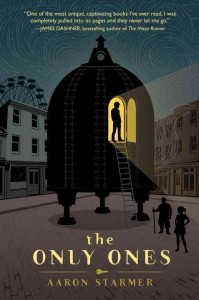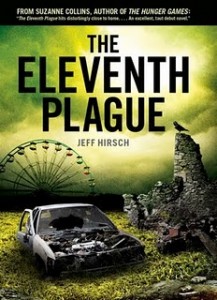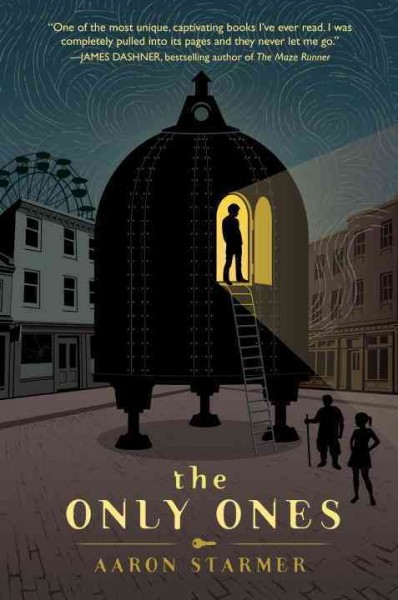“I wondered if this was what it was like when the end of the world came. A sudden overturning that made every day like stepping alone into an empty room, everything you longed for, every handhold you used to pull yourself along, vanished.” (Stephen, from The Eleventh Plague) Much has been made in recent months about the darker bent of YA lit and the growing fascination with end-of-the-world scenarios and dystopias taking over the once sunny, wholesome world of tween/YA lit (was it ever really so?). So I thought it particularly interesting that the 2 books next in my stack to read were both post-apocalyptic stories: Aaron Starmer’s The Only Ones for tweens and Jeff Hirsch’s The Eleventh Plague for teens.
 In The Only Ones, 11 year old Martin Maple lives on a island with his eccentric father, building a curious machine whose purpose is hidden from Martin. His father will only say it will bring them “hope.” When Martin’s father doesn’t return after a months’ long trip to the mainland to procure supplies for the machine, Martin decides he must leave the only life and place he’s ever know and try to find his dad. When he reaches the mainland, he’s unprepared for the reality that awaits him: nature is encroaching on once-bustling, now ruined and abandoned towns and cities, and there is no one alive anywhere. Eventually Martin makes his way to a remote town in the mountains where a small group of genius tweens have gathered, having created a “new town” where they each apply their on particular skills to the group’s survival, but no one really works together for the greater good. None of the kids can adequately explain what happened on “The Day,” nor do they have any idea why they’re the only ones left on Earth. It takes Martin to bring them together to build a machine, just like the one he left on the island, with the singular hope that by using it they can bring back everyone who disappeared on The Day.
In The Only Ones, 11 year old Martin Maple lives on a island with his eccentric father, building a curious machine whose purpose is hidden from Martin. His father will only say it will bring them “hope.” When Martin’s father doesn’t return after a months’ long trip to the mainland to procure supplies for the machine, Martin decides he must leave the only life and place he’s ever know and try to find his dad. When he reaches the mainland, he’s unprepared for the reality that awaits him: nature is encroaching on once-bustling, now ruined and abandoned towns and cities, and there is no one alive anywhere. Eventually Martin makes his way to a remote town in the mountains where a small group of genius tweens have gathered, having created a “new town” where they each apply their on particular skills to the group’s survival, but no one really works together for the greater good. None of the kids can adequately explain what happened on “The Day,” nor do they have any idea why they’re the only ones left on Earth. It takes Martin to bring them together to build a machine, just like the one he left on the island, with the singular hope that by using it they can bring back everyone who disappeared on The Day.
There’s a good blend of science-fiction, post-apocalyptic fable, and coming of age story in The Only Ones. There’s also some shocking violence and a fair amount of moral ambiguity and unsettling repercussions in this book too. The descriptions of the ravages and remnants of the world, the kids’ understanding of what happened to them, and their coping skills are all handled in an age-appropriate way, and the questions that Starmer raises about choice, responsibility, and meddling with something larger than yourself are certainly thought-provoking. I didn’t really like the explanation for why this particular group of kids was left behind and I felt unsatisfied on a few occasions by characters, plot points, and mysteries that were left unanswered. Ultimately, I felt that The Only Ones is more tragic than hopeful because while Martin is able to fulfill his (and his father’s) one true hope, it’s that choice and that act that sets the entire tragedy of “The Day” in motion.
15 year old Stephen Quinn has lived his life in the aftermath of the Collapse. Before he was born, the Chinese invaded the Western US, unleashing a biological weapon, the Eleventh Plague, that killed almost everyone in North America and caused the Collapse of society as we knew it. His life has been dictated by his fierce retired Marine grandfather, who drove the family along various routes on the Eastern seaboard scavenging for anything useful. It’s a world rife with danger – marauders, slavers, wild animals, natural disasters, and more – where every person can only depend on themselves and their survival skills. When novel opens, Stephen and his dad are burying their grandfather behind a dilapidated old mall after he’s succumbed to the ravages of an unchecked infection. At first, Stephen imagines their lives will continue as before – he’ll keep his head down, follow orders, and scavenge to survive – but then in a unexpected act of heroism, his dad throws their lives in a whole new, unexpected direction.
that killed almost everyone in North America and caused the Collapse of society as we knew it. His life has been dictated by his fierce retired Marine grandfather, who drove the family along various routes on the Eastern seaboard scavenging for anything useful. It’s a world rife with danger – marauders, slavers, wild animals, natural disasters, and more – where every person can only depend on themselves and their survival skills. When novel opens, Stephen and his dad are burying their grandfather behind a dilapidated old mall after he’s succumbed to the ravages of an unchecked infection. At first, Stephen imagines their lives will continue as before – he’ll keep his head down, follow orders, and scavenge to survive – but then in a unexpected act of heroism, his dad throws their lives in a whole new, unexpected direction.
Stephen stumbles into a deeply hidden pocket of twentieth century suburbia – a village of perfect houses, plenty of food and goods, a school full of books, kids who love playing baseball after school – a world that seems to have escaped the Collapse. He’s distrustful and wary of this “perfect” world, knowing deep down that the outside (or maybe the problems people are hiding behind their perfect front doors) will find a way to creep in and destroy this haven. But there’s a part of him that yearns to accept the peace he’s found here and the chance to set down his burdens and hope for a future different from the past. Like many dystopias, The Eleventh Plague is a metaphor for young adults’ age-old disillusion with the world, social norms, and restrictions their parents have created. Here, the adults have literally destroyed the world and their continued petty struggles threaten to ruin any chance at peace or healing. But Stephen and the most of other teens he meets won’t accept the life and the ruined world their parents’ generation is handing them; instead, they see the errors in their parents’ ways and they make the hard, and righteous, choice to behave differently. And in so doing, maybe they will change the world for the better.
- Posted by Cori

